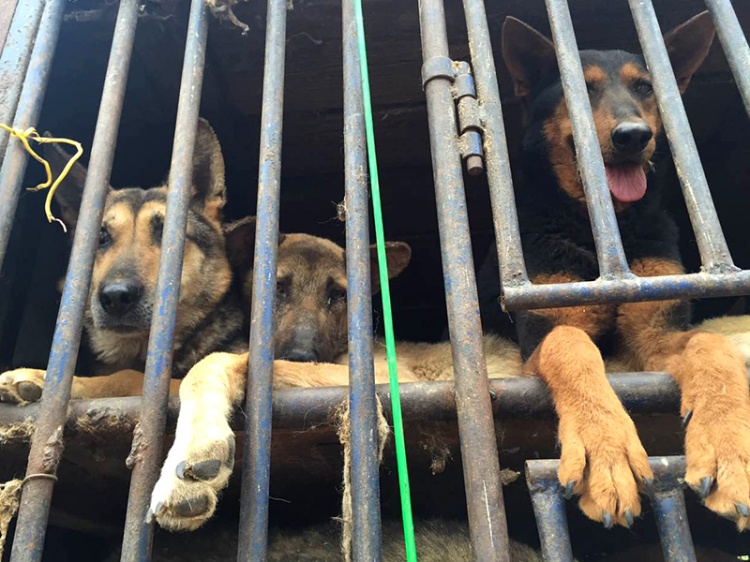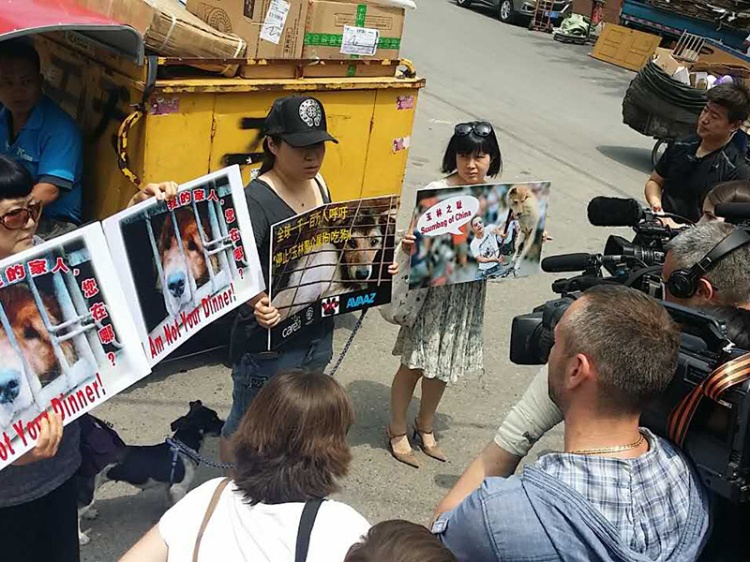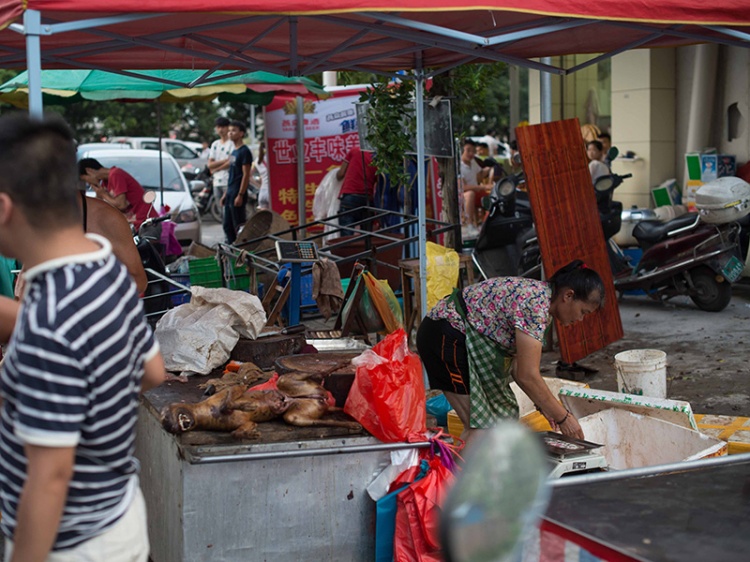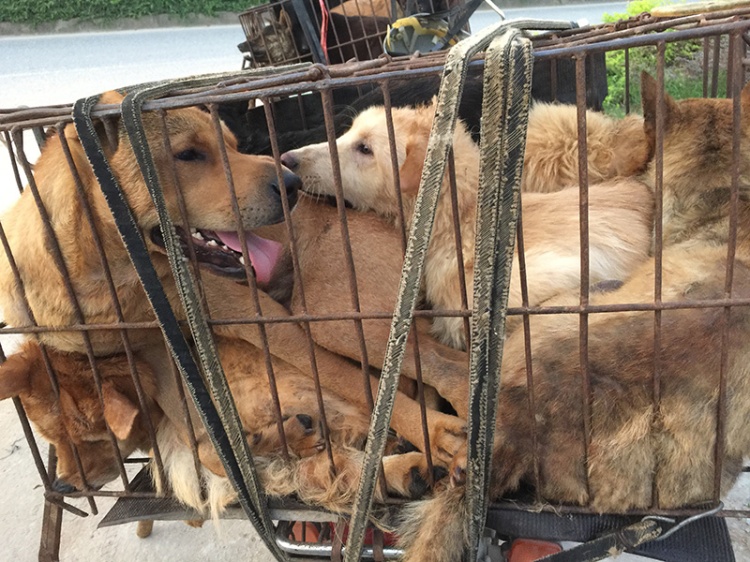Once again, another Yulin dog meat “festival” has come and gone. For the sixth year in a row, pet meat enthusiasts converged upon the small southern Chinese city to “celebrate” the summer solstice by gorging on heaping plates of cooked dog flesh and lychee fruit. Right alongside them, and more than happy to put a damper on the festivities were the local and international animal activists who’ve made it their mission over the past several years to protest the festival, record the carnage, and save dogs from the butcher’s block. Meanwhile, animal lovers throughout the globe signed petitions, donated to anti-dog meat campaigns, and watched with outrage as the notorious event unfolded yet again.
Although Humane Society International claims that the festival has grown smaller and more subdued over the past few years, down from killing an estimated 10,000 dogs at its height in 2012 to approximately 1,500 dogs, some activists have expressed concerns that butchers have merely taken their brutal activities underground, making it difficult to know just how many dogs – most of them lost or stolen pets – are actually being slaughtered.
But just a month later, it’s back to business as usual for the dog meat trade in Yulin. The dust has settled as media have moved on, international activists have turned their attention to other heated issues, and global interest has waned. The festival has done nothing but put a black mark on China’s reputation, sparking intense domestic and international condemnation, yet while the local government has distanced itself from the festival, it has so far made no attempts to ban it.

Dogs languish in a meat truck as they wait to be unloaded into the festival. The majority of dogs used in the Chinese meat trade are lost and stolen pets that are often transported for long distances to rural areas where dog meat is in demand. These shepherds could have been trucked for several days across the country to Yulin, without food, water, or rest. (Photo courtesy HSI)
As someone who has been researching and spreading awareness about the dog meat trade for over three years now, I have to wonder if things are getting any better for animals in China. Are we any closer to seeing an end to this festival of death and abuse, and a criminal industry estimated to murder 10 million dogs a year, in a nation that sorely lags behind other developed nations in animal welfare?
For answers to that loaded question, I consulted three experts who have made it their mission to document, expose, and fight animal cruelty throughout Asia – a front-line rescuer, a photojournalist and videographer, and an official from a leading international animal welfare organization. All three attended Yulin this year and were kind enough to share their experiences, thoughts, and ideas with me, including where they believe the dog meat trade is headed in China.

Chinese activists speak to the media at the Yulin festival. According to Humane Society International, the movement against the dog meat trade in China began as a grassroots movement from within the country. (Photo courtesy HSI)
Marc Ching arrived in Yulin with a very lofty goal – to document the atrocities, raise global awareness, and decrease the supply of dogs to the festival. As the founder of the Animal Hope & Wellness Foundation, a small Los Angeles-based rescue group that saves dogs from abuse and torture situations, Ching has made it his mission over the past year to rescue dogs from the meat trade throughout Asia and expose the industry for what it is – barbaric, cruel and criminal.
Six weeks prior to the festival, Ching journeyed to Yulin with the intention of doing something no other anti-dog meat activist has attempted thus far – to convince slaughterhouses to suspend their operations during the festival. After much financial bargaining, six of the 11 operators he met with agreed. However, when Ching returned to Yulin two days before the event to shut them down as planned, he realized his rescue mission was going to be a much bigger undertaking than originally anticipated, as those six operations had 1,000 dogs between them – dogs with nowhere to go.
What followed was a whirlwind rescue operation, culminating in just under 300 dogs being taken to three temporary shelters Ching had set up in Nanning and Guangzhou, 120 to an HSI shelter in northern China, and the rest to the Tree of Life in Guangzhou and Gaoyao.
For more details about this massive rescue, please go here. You can also check out more images and video on the Animal Hope & Wellness Facebook page.

Stressed and exhausted dogs await their fate in a meat cage. (Photo courtesy Animal Hope & Wellness Foundation)
But while Ching received overwhelming encouragement from his supporters, he found himself the target of strong criticism from domestic and international rescue groups strongly opposed to activists purchasing large numbers of dogs from meat traders. To drive this point home, Animals Asia, an international animal welfare organization that works to end the dog meat trade in Vietnam and China, released an open letter in conjunction with 35 China-based rescues, urging animal rescuers to abstain from buying dogs from the event, and citing the practice as counterproductive and damaging to the growing anti-dog meat movement within the country (Founder Jill Robinson also released a very insightful article several days later that explains her organization’s stance on how to most effectively end the festival and the trade).
Although Ching wholeheartedly agrees that paying off dog meat traders and butchers is not the solution to stopping the trade, he passionately defends his actions at Yulin.
“I don’t support the buying of dogs, and I didn’t go there to (do that), it was a consequence of temporarily shutting down those slaughterhouses,” he explained. “I couldn’t leave those dogs behind. If I had, the whole world would have slandered me and they would have had just cause to do so. When you’re a spectator it’s easy to (criticize what I did), but until you’re in that moment, with dogs screaming and dying, you really can’t say anything.”

A typical dog meat vendor on the streets of the Yulin festival. (Photo courtesy Martyn Stewart)
As someone who wasn’t well-versed with the inside politics of large animal welfare groups, Ching said he found his interactions with them before and during the festival incredibly eye-opening and disillusioning, in that many seemed more concerned about elevating their profiles and pandering to donors than the welfare of the dogs.
“Before I went to Yulin, I reached out to all the big groups and said, ‘help me, and if you disagree with me, teach me and help me to be better,’ but everybody said no, so I went in and did what I felt I had to do,” he remarked. “I’m sure they thought, ‘look at this guy trying to be famous from doing this, he’s trying to bloat his image,’ but they don’t understand what I’m all about, or what I’m trying to do, or that I’ve destroyed my life for this. When you document torture for a living it’s a heavy burden to bear.”
Despite his less-than-positive interactions with humans at Yulin, Ching says he’s satisfied with what he and his volunteers accomplished, whether anyone agrees with his tactics or not.
“The typical Chinese method is to stop trucks, then test dogs for disease, but they’ve been doing this for the last 5-10 years,” he asserted. “I respect those groups that have that opinion, but you can’t do the same thing every year and expect a different result. In the field, in war, you do what you have to do to save lives and you do your best. Because of our Foundation, lives were saved and incredible awareness was raised. The goal is to end the festival, and to show that change is possible.”
Check out the Animal Hope & Wellness Foundation’s Compassion Project PSA, which was released prior to Yulin:
Although Martyn Stewart also disagrees with activists buying dogs from meat traders, he does believe that every dog deserves a second chance. After all, he happens to be the proud dad of a Tosa mastiff rescued from a South Korean dog meat farm last fall by HSI. As a veteran sound recordist, videographer and photojournalist, Stewart has documented myriad examples of animal cruelty throughout the globe, including the dog meat trade in South Korea and China, but had never had the chance to attend Yulin until this year.
“I did a story for the BBC on the night of 21st, and stayed for several days afterward to see what was happening,” he explained. “I went into the dog meat markets and shot video of them chopping dog carcasses up, and filmed inside a slaughterhouse. We walked through restaurant after restaurant after restaurant full to the gills with people eating dog. The stench was horrible, and in the heat and humidity, it just stays with you in your nose.”
Like most activists who’ve been following the horrific event for several years, he expected the scene to reflect what he’d read in the media. But in the end, what he experienced turned out to be a bit different from those exaggerated reports and embellished truths.
“A lot of newspapers across the world were trying to sensationalize things, trying to make one isolated story, and hype it up to the point where it wasn’t really true,” he said. “There wasn’t all this aggression, all this in-your-face, no people trying to smash my equipment, as I’d been warned. There was some of that, but certainly, there were no ‘Angels of Yulin’ flying into the festival with capes on their backs and flying out with dogs. To me, Yulin appeared to be a pop-up activist’s dream for those trying to make a name for themselves, but at the detriment of the animals.”
Check out Martyn’s video of the festival (note: there are some disturbing images but no footage of dog slaughter):
On a positive note, Stewart felt encouraged by the conversations he engaged in with several Yulin citizens, most of whom didn’t like the idea of eating dog, as well as butchers who said their businesses had taken a drop in sales due to all the activism, outside pressure, and the government no longer endorsing the event. He had good reason to be optimistic – a recent survey commissioned by HSI shows that 64 percent of Chinese citizens between the ages of 16-50 would support a permanent end to the Yulin festival, that nearly 52 percent want the dog meat trade to be banned, and almost 70 percent claim they’ve never eaten dog. Still, Stewart admits that any expectations he’d entertained about Yulin being canceled next year were dashed by the sheer magnitude of the event.
“I went to Yulin convinced this would be the last because of all the hype and the pressure, but after seeing the reality of the festival and the extent of the dog meat being eaten, you realize that if this is the end, something miraculous has got to happen. Ending it has to come from within China, and legislation has to be put in place, which takes time, so thinking you’re going to go in there and close it all down in space of a few days, that’s not realistic. We have a million miles to go before we can even start to consider ending this festival, and Yulin is just another extension of somewhere else.”

Dog meat traders count their spoils. (Photo courtesy Martyn Stewart)
Peter Li, China policy specialist for HSI, has a more hopeful outlook about the impending demise of the dog meat trade in China. As someone who has attended Yulin for three years in a row to research, document, and expose the festival, as well as rescue small numbers of dogs and cats, he believes the government is closer than ever to not only banning the barbaric festival, but also the industry (he breaks down the history, practices, and attitudes about the Chinese dog meat trade in this must-read article).
“In China, we don’t need more laws to shut down the dog meat trade,” he explained. “If the government enforced its existing laws and regulations, the trade would be dead. China is the only country among all the major developed nations that doesn’t have animal protection laws, so it’s about 194 years behind the rest of the industrialized world. We will continue to encourage them in enforcing existing laws, and press on for animal protection legislation there.”
But going the slow, legislative route toward permanent change can take years, if not decades to accomplish. Meanwhile, untold millions of dogs (and cats) will continue to die to satisfy the nation’s small minority of pet meat enthusiasts. When faced with that overwhelming thought, isn’t it understandable that front-line activists and rescuers would feel driven to go into blood spectacles like Yulin and save as many lives as possible?

Another common sight at Yulin – sick, stressed and dying dogs arriving at the festival crammed into cages on the backs of mopeds. This horrible industry has been directly linked to rabies outbreaks in humans, a common health problem in regions where the trade is most common, such as Yulin. (Photo courtesy HSI)
“No system of slavery or oppression should be allowed to continue, and we all wish this trade could be ended overnight,” he said. “But we agree with the statement that Animals Asia put out that animal welfare groups should not buy dogs in great numbers on the festival day, and in competition with other groups. That gave dog meat traders the opportunity to practice extortion by raising prices. They were doing it last year and the year before, brutalizing and humiliating activists who were buying dogs, and threatening to torture the animals if the activists didn’t pay top dollar for them.”
He continued, “We do not accept animal suffering, and I cannot agree more that we should stand up to be the warriors for animals, but there are different ways to solve these problems. Incremental change and progress will lead to the ultimate demise of the industry, and we have seen great changes in the last few years.”
According to Li, the Yulin government publicly disassociating itself from the festival in 2014 was a big step toward shuttering the festival, as is the tremendous domestic and international pressure that continues to come at the city from all sides. But for the first year ever, the Yulin controversy reached Chinese President Xi Jinping in the form of a formal resolution drafted by U.S. Congressman Alcee Hastings (D-Fla), and a letter from HSI – along with the signatures of 11 million people from around the world – calling on China to shut down the festival and ban the trade. What happens next is anyone’s guess.

A few of the 120 dogs HSI took on from Marc Ching’s 1,000-dog rescue, resting up at the organization’s shelter in north China. All will eventually be placed in loving homes in the U.S., Canada, and the U.K. Some very little pups indeed! (Photo courtesy HSI)
The hope is that the Yulin government will finally wake up and realize that the damage the festival has caused to its city and country’s reputation is no longer worth the trouble. But until that happens, it’s important to understand that China’s dog meat problem goes way beyond one annual festival, said Li.
“Yulin is just a tiny part of China’s criminal dog meat trade,” he asserted. “HSI has been in China for the last decade, and we’ve been fighting a war against Asia’s dog meat trade on many different fronts and levels because we believe this trade is a comprehensive challenge. There is no quick solution. (An animal welfare organization must have a presence) in China all year long and the strategy has to be multi-layered and leveled.”
Although we may still have quite a distance to go until the pet meat trade is extinguished and buried in the history books as yet another shameful practice we humans once condoned, I remain hopeful that China is indeed on its way to becoming the more compassionate society it has every potential to be, for both animals and humans. Banning the Yulin festival will be an important first step in repairing the country’s global reputation, and demonstrating its intention to catch up with the rest of the developed world in animal welfare.
But before we westerners go pointing fingers and condemning other countries and cultures for their inhumane practices, let’s look in the mirror and take responsibility for the cruelties we inflict upon animals day after day in our own respective countries, whether in factory farming, puppy mills, entertainment, or the fur trade. Why is it okay to judge others for eating dogs or cats, when we greedily consume billions of chickens, cows, pigs and sheep (the U.S. and Australia hold court as the largest consumers of meat per capita) every year? Don’t we inflict plenty of pain and suffering upon these poor, sentient beings behind the closed doors of our nation’s slaughterhouses?

The faces of the condemned at the Yulin festival. No innocent being deserves such a fate. (Photo courtesy Martyn Stewart)
It’s easy to get riled up about the Yulin dog meat festival, but keep in mind that this one event, horrible as it is, is only a small extension of a massive, 365-day industry that also thrives across other Asian countries including South Korea, Vietnam, Thailand, Laos, Cambodia, and Indonesia. Stopping it won’t come from without, from westerners expressing outrage and telling these cultures what they can or can’t eat, but from within. Although we don’t hear about them due to the country’s highly censored internet, there are countless Chinese animal welfare groups made up of incredibly dedicated activists who have been diligently working for years against a system designed to support the exploitation and persecution of animals. They are the unsung heroes in this fight, and we must support their efforts whenever possible.
If you’d like to help end the dog meat trade in China and Asia, do your research and only support licensed charities that are open and transparent about their mission; have a verifiable track record of how they use their funds; don’t make a practice of bashing other rescue groups, and always make the animals their top priority.
We humans have created every single animal welfare problem that exists on this planet. We have been ignorant, selfish, entitled, and delusional in believing animals were put on this earth to serve our purposes, do our bidding, and “give up their lives” for our gastronomic pleasure. It’s time for our species to wake up, grow up, and start viewing animals for what they are – intelligent sentient beings who deserve to live out their lives in safety and peace. As our voiceless brothers and sisters with whom we share this beautiful planet, they deserve our guardianship and respect. It’s the least we can do for them.
“The world is a dangerous place, not because of those who do evil, but because of those who look on and do nothing.” – Albert Einstein
Want Care Like I Do delivered directly to your inbox? Please hit the “Follow” tab at the bottom right of the page and subscribe!